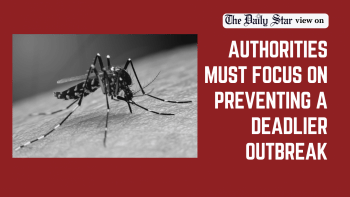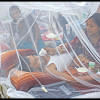Will dengue be even more fatal this year?

It may be a new Bangladesh with countless possibilities, but ordinary citizens are facing the same problems that have been plaguing them for years. We have written countless editorials decrying the inadequate dengue management efforts of the previous government, and we remain concerned that, in the void created by the absence of officials in the city corporations and municipalities in the aftermath of the July uprising, even the usual activities are suspended or have become sporadic at best. As a result, health experts are now warning of a deadlier dengue outbreak than the previous ones.
In Chattogram, for instance, the situation is particularly dire. The fatality rate in the port city now stands at 1.30 percent—more than double the national rate of 0.60 percent—despite the relatively low number of hospital admissions. The Den 2 serotype, identified as a major culprit in previous years, may be playing a significant role in the current outbreak, according to health experts. This particular serotype is known for its higher virulence, making it more likely to lead to severe complications and fatalities.
While the Chattogram City Corporation claims to be conducting regular insecticide spraying and clearing mosquito breeding grounds, residents report inconsistent efforts and inadequate coverage. Despite the severity of dengue over the years and the repeated calls for a comprehensive, scientifically driven and centrally coordinated initiative, we did not see any notable efforts of the past government or the city corporations to effectively address the public health menace. Meanwhile, issues such as inadequate sanitation, poor waste management and unplanned urbanisation have created environments that are conducive to mosquito breeding. These underlying problems require long-term solutions that go beyond short-term mosquito control measures.
While we understand that the interim government has many urgent tasks to deal with, we urge it to take prompt and comprehensive action to address dengue before it becomes a public health emergency and puts an already flailing healthcare system under more strain. In fact, with reforms being promised in every sector, now is the time for Bangladesh to learn from past mistakes and establish a comprehensive vector management system. This system should include year-round mosquito monitoring and surveillance to enable targeted interventions. We also need centralised recording of dengue cases across all healthcare facilities for accurate data analysis, and bolster our healthcare system to deal with dengue cases, especially outside of Dhaka. Ultimately, we need a collaborative effort among the government, city corporations, health authorities and citizens to prevent future dengue outbreaks. By implementing proactive, sustained and integrated measures, Bangladesh can finally, we hope, effectively control the spread of this disease.


 For all latest news, follow The Daily Star's Google News channel.
For all latest news, follow The Daily Star's Google News channel. 









Comments